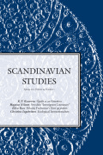
SCANDINAVIAN STUDIES
metrics 2024
Advancing Scholarship in Scandinavian Linguistics and Literature
Introduction
SCANDINAVIAN STUDIES is a prestigious journal dedicated to advancing the understanding of Scandinavian languages, literature, and culture. Published by the Society for the Advancement of Scandinavian Studies in the United States, this journal has been a key resource for scholars since its inception in 1974, covering a breadth of topics in both Linguistics and Literary Theory. With an impactful presence within academic circles, it has achieved a notable ranking in the Q2 category for Literature and Literary Theory, and Q3 for Linguistics and Language, ensuring its relevance among leading journals in the humanities. The journal is indexed in reputable databases, including Scopus, where it ranks in the 65th percentile for literature studies. Although it is not open access, SCANDINAVIAN STUDIES provides critical insights and scholarly contributions that greatly enhance discourse in Scandinavian studies. Researchers, professionals, and students alike will find this journal a valuable tool for deepening their understanding of the rich tapestry of Scandinavian contributions to world culture.
Metrics 2024
 0.12
0.12 0.30
0.30 0.60
0.60 14
14Metrics History
Rank 2024
Scopus
JCI (Web Of Science)
Quartile History
Similar Journals

Lingua Montenegrina
Advancing Understanding of Montenegrin Identity Through ScholarshipLingua Montenegrina is a distinguished academic journal dedicated to exploring and advancing the fields of Montenegrin language and literature. Published by the Institute of Montenegrin Language and Literature, this journal serves as a vital platform for researchers, educators, and students interested in the nuances and development of Montenegrin linguistics, literature, and cultural studies. With an ISSN of 1800-7007, it contributes significantly to the scholarly discourse in the region and beyond. While the journal operates under a traditional subscription model, it ensures that its readership has access to high-quality research that is pivotal for understanding Montenegrin identity and cultural expressions. The commitment of Lingua Montenegrina to rigorous academic standards and its focus on regional studies positions it as an essential resource for those looking to deepen their understanding of the Montenegrin language and its literary heritage.

Scandia
Challenging Narratives, Shaping PerspectivesScandia is a distinguished academic journal dedicated to the field of history, published by SCANDIA in Sweden. With its origins dating back to 1976, the journal offers a platform for scholarly discourse, focusing on various historical perspectives and methodologies. Although currently not recognized as an Open Access journal, it fosters a rich exchange of ideas and original research, appealing to historians, researchers, and students alike. Operating within the Q4 quartile of its category for 2023, Scandia holds a significant position in the history landscape, ranking at #1627 out of 1760 in Scopus, representing the 7th percentile. With a commitment to quality scholarship, Scandia encourages contributions that challenge existing narratives and contribute to the broader understanding of historical contexts.
Please send your submissions or inquiries to the editorial office at Historiska Inst, Box 2074, Lund 220 02, Sweden.
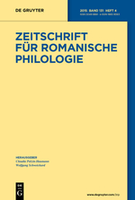
ZEITSCHRIFT FUR ROMANISCHE PHILOLOGIE
Advancing Scholarship in Linguistics and Literary TheoryZEITSCHRIFT FUR ROMANISCHE PHILOLOGIE, published by Walter de Gruyter GmbH, stands as a prominent peer-reviewed journal dedicated to the fields of Linguistics, Literature, and Literary Theory. Established in 1877 and continuing its legacy to the present day, this esteemed journal offers a platform for comprehensive scholarship that explores the intricacies of Romance languages and their literary heritage. With a notable Q1 ranking in Literature and Literary Theory and a Q2 ranking in Linguistics and Language, it has secured its place among leading resources in the humanities. Researchers, educators, and students benefit from its rich historical context and current contributions to the understanding of Romance languages and literature. Though currently not available as Open Access, the journal prioritizes the dissemination of high-quality research, making significant strides in fostering academic dialogue and advancement. Its address at Genthiner Straße 13, Berlin, Germany, situates it in a hub of scholarly activity, bridging the past with contemporary literary discourse.

Nordisk Judaistik-Scandinavian Jewish Studies
Fostering Interdisciplinary Insights into Scandinavian Jewish LifeNordisk Judaistik-Scandinavian Jewish Studies is a distinguished academic journal dedicated to the exploration of Jewish culture, history, and religious practices in the Scandinavian context. Published by the DONNER INSTITUTE FOR RESEARCH ON RELIGIOUS AND CULTURAL HISTORY in Finland, this journal has been an open access platform since 2016, allowing easy dissemination of knowledge and fostering scholarly communication among researchers, educators, and students. With a variety of subjects encompassing Anthropology, Cultural Studies, History, and Religious Studies, the journal has achieved commendable recognition, with its latest rankings placing it in Q2 in several categories according to the 2023 Scopus rankings. The journal's significant contribution to the field is evident through its impact, evidenced by its strategic position within its respective quartiles. By bridging interdisciplinary methodologies and Jewish studies within a Scandinavian framework, Nordisk Judaistik serves as an essential resource for those engaged in the complexities and nuances of Jewish heritage and identity in the region.
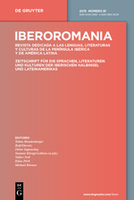
IBEROROMANIA
Navigating the Rich Tapestry of Romance Linguistics and LiteratureIBEROROMANIA, published by WALTER DE GRUYTER GMBH, stands as a pivotal journal in the fields of Linguistics and Language and Literature and Literary Theory. Since its inception in 1969, IBEROROMANIA has facilitated scholarly discourse by providing a platform for cutting-edge research that explores the complexities of Romance languages and their literatures. The journal is recognized for its valuable contributions, currently holding a Q3 quartile ranking in Linguistics and Language and a Q2 ranking in Literature and Literary Theory as of 2023. With its diverse scope spanning several years, including works from 1970 to 2024, IBEROROMANIA is pivotal for researchers, professionals, and students alike, fostering a deeper understanding of Romantic linguistic and literary frameworks. Although it does not provide open access, its impact in the Arts and Humanities is underscored by its Scopus rankings, reflecting a commitment to high-quality scholarship. For those dedicated to exploring the nuances of Romance languages and literature, IBEROROMANIA is an indispensable resource.

GERMANISCH-ROMANISCHE MONATSSCHRIFT
Connecting Cultures through Scholarly ExplorationGERMANISCH-ROMANISCHE MONATSSCHRIFT, published by UNIVERSITATSVERLAG C WINTER HEIDELBERG GMBH, is a vital academic journal dedicated to the fields of linguistics, literature, and literary theory. With its ISSN 0016-8904, this journal fosters scholarly discussions and disseminates innovative research that intersects Germanic and Romance languages and literatures. While it does not currently offer Open Access options, its contributions have positioned it within the Q4 quartile in both Linguistics and Language, and Literature and Literary Theory according to the 2023 category rankings. The journal's Scopus ranking reflects its emerging place within the academic community, situated at the 40th percentile for Literature and Literary Theory, and the 20th and 18th percentiles within Language and Linguistics, respectively. Scholars and students are encouraged to engage with this resource as it offers a platform for new perspectives that are pivotal to understanding the complex interrelations of these linguistic traditions, enriching both teaching and research initiatives.
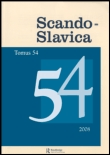
Scando-Slavica
Illuminating the Rich Tapestry of Scandinavian and Slavic ScholarshipScando-Slavica is a renowned academic journal published by ROUTLEDGE JOURNALS, TAYLOR & FRANCIS LTD, specializing in the rich interplay of Scandinavian and Slavic studies. With its ISSN 0080-6765 and E-ISSN 1600-082X, the journal has been a critical resource for scholars since its inception in 1954, covering a wide range of disciplines including archaeology, cultural studies, history, linguistics, and literature. As of 2023, it has consistently ranked in the third quartile across various categories, indicating its influential role in disseminating innovative research within the arts and humanities. With a focus on interdisciplinary dialogue, Scando-Slavica aims to foster a deeper understanding of cultural exchanges and linguistic connections, making it an essential read for researchers, professionals, and students interested in exploring the complexities of Nordic and Slavic interactions. While currently not an open access journal, its contributions have garnered substantial citations, bolstering its academic impact and relevance in a diverse scholarly landscape.

Slavia-Casopis pro Slovanskou Filologii
Unveiling the Rich Tapestry of Slavic PhilologySlavia-Casopis pro Slovanskou Filologii is an esteemed journal dedicated to the advancement of Slavic philology, published by the SLOVANSKY USTAV AKAD CESKE REPUBLIKY in the heart of the Czech Republic. With its ISSN: 0037-6736, the journal serves as a vital platform for scholarly exchange, embracing a rich academic tradition since its convergence years beginning in 2002. The journal has achieved notable recognition, with a Q3 ranking in Linguistics and Language and a Q2 in Literature and Literary Theory as of 2023, highlighting its contribution to these dynamic fields. Although it does not currently offer open access, its rigorous selection of articles ensures that it remains a crucial resource for researchers and practitioners alike, facilitating a deeper understanding of Slavic languages and literature. Scholars benefit from the journal's extensive research backdrop, enhanced by its current ranks in the Scopus database, underscoring its significant placement within the academic literature landscape. The editorial scope of Slavia promotes innovative inquiries that reflect cultural, historical, and theoretical perspectives endemic to Slavic studies, making it indispensable for professionals, students, and enthusiasts invested in the exploration of Slavic linguistic and literary heritage.

MELUS
Advancing Critical Perspectives on Culture and IdentityMELUS (Modern English Language and Literature Studies), published by Oxford University Press Inc, is a leading academic journal dedicated to exploring the complexities and dynamics of American literature and culture from various critical perspectives. With a strong historical foundation since its inception in 1974, MELUS is recognized for its contributions to both Cultural Studies and Literature and Literary Theory, achieving notable rankings in the Q2 and Q3 quartiles respectively as of 2023. The journal's articles are essential for scholars and practitioners seeking to engage with contemporary literary discourse, featuring innovative research that challenges conventional understandings of cultural identity and representation. Although it does not offer Open Access options, MELUS remains a crucial resource for academic libraries and research institutions in the United States and beyond, providing access to cutting-edge scholarship that informs the study of literature in a global context. For those invested in the field, MELUS serves as an invaluable platform for disseminating transformative ideas and fostering discussions that shape the future of literary studies.
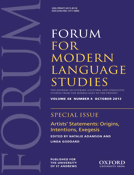
FORUM FOR MODERN LANGUAGE STUDIES
Connecting Scholars through Language and Literary ExplorationFORUM FOR MODERN LANGUAGE STUDIES is a prestigious academic journal published by Oxford University Press that has been serving the fields of literature and linguistics since its inception in 1965. This journal, with an ISSN of 0015-8518 and an E-ISSN of 1471-6860, plays a crucial role in advancing scholarly discourse on modern language studies, including literature and literary theory. With an impactful presence in both the linguistic and literary domains, it has been recognized in 2023 with a category ranking of Q2 in Literature and Literary Theory and Q3 in Linguistics and Language. It stands out in the competitive landscape, holding a notable position within Scopus rankings, including a 70th percentile ranking in Literature & Literary Theory. While the journal currently does not offer open access options, it remains a vital resource for researchers, educators, and students passionate about the transformative power of language and literature. Its commitment to quality research and robust academic discussion underscores its importance, making it a key platform for those aiming to contribute to modern language scholarship.